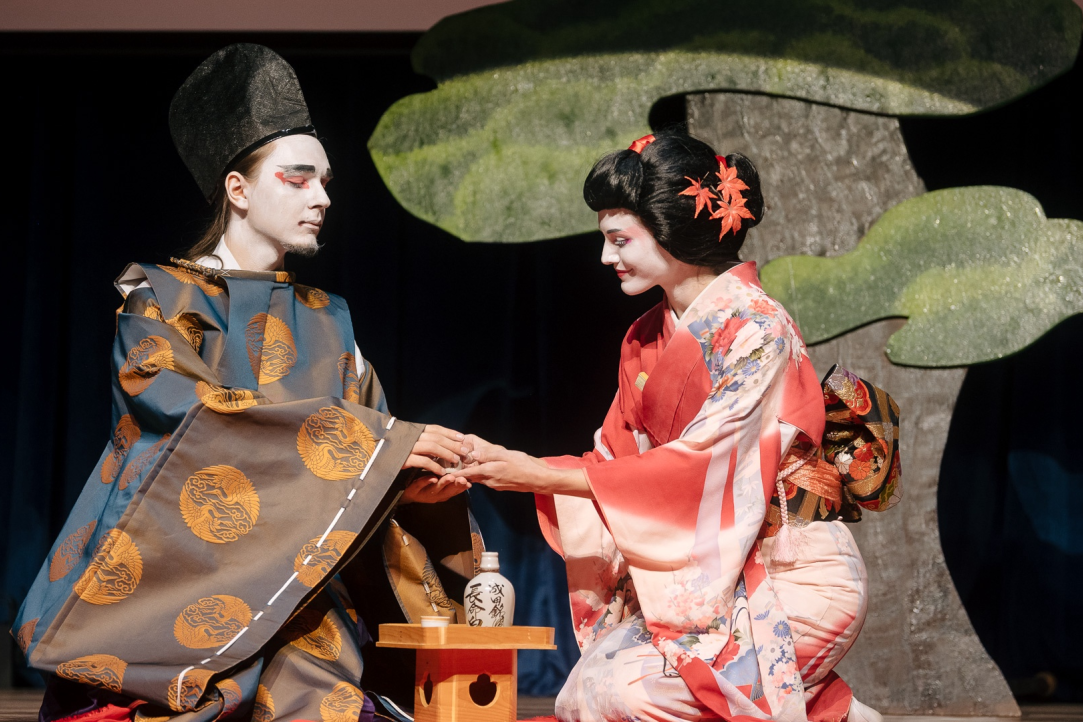Japanese Theatre, Dance and Calligraphy at Oriental Crazy Day 2022

Oriental Crazy Day is a traditional festival of the School of Asian Studies, which has been held at HSE University for eight years. This time, Asian Studies students taught guests Chinese calligraphy, Arabic script, Yemeni dancing and origami. They were also introduced to kabuki theatre and traditional Japanese drums.
Space and science
This year's Oriental Crazy Day was particularly well attended. Fans of Oriental culture filled the Small and Large Halls, as well as the foyer of the HSE University Cultural Centre. ‘The only thing that worries me is where to hold Oriental Crazy Day next year, because we have already surpassed the capacity of this space,’ admits Anastasia Likhacheva, Dean of the Faculty of World Economy and International Affairs, with a smile.
Mini-lectures were held in the Small Hall of the Cultural Centre, where Asian Studies students talked about their research. ‘The more consciously you approach the scientific path, the less traumatic and painful your first scientific experience will be,’ said second-year student Ivan Tyulenev. ‘Science is not a path for the chosen few, but a real tool for solving problems. Asian Studies allows us to solve problems by drawing on the experiences of different peoples and cultures. Specialised knowledge through unique expertise and the ability to change people's mindsets impose a responsibility on researchers that needs to be recognised,’ he believes.

First year student Polina Saakyan spoke about the history and styles of Chinese calligraphy, in which there are eight principles of Yong—eight simple features that can be practised to achieve mastery. ‘The technique of writing Chinese characters is an art. It's important to pay attention to the wrist, the width of the brush, its inclination and the trajectory of the wrist,’ she said. There are even special names for spelling errors: 'cow's head', 'mouse's tail', 'wasp waist', 'crane's knee'.
During the day’s master classes, experts demonstrated the practical aspects of the art of calligraphy. ‘There is no hurry to draw Chinese characters,’ said tutor and guest lecturer at the School of Asian Studies Artur Fanian. ‘A true sinologist draws energy from these slowly drawn characters.’ He personally demonstrated the complexity and variety of Chinese writing. For example, the combination of the characters ‘eye’ and ‘walking man’ means ‘to see’: if you can ‘walk’ with your eyes, you can see.
Mask dance and ‘Squid Game’
Korean Studies scholars combined rich history and contemporary trends in a story about their field. Guests could take part in a quiz on ‘The Korea of the Past’ in which they had to answer questions about the country's history and culture to earn points and prizes. There was also a game called ‘Honeycomb’ inspired by the cult Korean series ‘Squid Game’: participants had to use a needle to quickly cut out a figure printed on a sugar candy.
The combination of Korea's past and present was also reflected in the multicultural concert that took place in the Large Hall of the Cultural Centre. Korean scholars spoke about the rich contemporary culture through cover dances and songs by South Korean groups EXO, (G)I-DLE, STAYC, ITZY, NCT, TXT. Later, the same stage hosted a traditional Talchum Korean mask dance accompanied by national drums. Talchum aims to reflect reality: its main themes are usually human frailties, satire, rites of exorcism and mockery of the upper classes.

Origami and kabuki theatre
The event also featured various stands devoted to Japanese culture, including master classes in origami folding. Lovers of folklore could take part in a quest to find the Russian equivalent of a Japanese proverb or to guess the meaning of an untranslatable saying.
One of the highlights of the concert programme on the stage of the Large Hall was a performance of ‘A Cruel Angel's Thesis’, the soundtrack to the anime series Evangelion and a famous hit from the 1990s–2000s. The Taiko Drums Oo-Nami group—a collective of young enthusiasts from the world of music, theatre and martial arts—gave a performance on traditional Japanese taiko drums.
The highlight of the Oriental Crazy Day concert was a production of the Japanese kabuki play Momijigari. Traditionally, all roles in kabuki are played by men, but HSE University’s production restored the gender balance and had some of the male roles played by women.
Japanese theatre is notable for its almost-total lack of scenery. ‘In kabuki, there is a tradition of building soundscapes rather than building large scenic structures on the stage itself. It is enough to make a couple of sounds, the meaning of which everyone knows, for them all to understand everything,’ explained the director of the performance, guest lecturer of the School of Asian Studies Natalia Klobukova. The on-stage atmosphere was created using drums, a shamisen, and other Japanese instruments.
The iron candlestick and Yemeni dancing
Middle-East experts spoke about the intricacies of writing in ligature. The participants learned how to do cursive writing and received notes with predictions.
Guests of Oriental Crazy Day could also compete in a contest to guess the flags of Arab countries—not everyone succeeded. A test on Middle-Eastern dress was even more difficult, challenging even experienced experts.

The concert also featured the performance of a scene based on the Middle-Eastern parable ‘The Iron Candlestick’. In the story, the character of Abdullah goes on a journey with a dervish (a Muslim monk), who helps him get an iron candlestick that grants gold coins. Abdullah takes the candlestick and steals some gold from a treasure dungeon. This unauthorised theft angers the dervish, who confiscates the candlestick. In retaliation, the resourceful Abdullah steals the candlestick from the dervish; however, he breaks the rules for using the magical artefact and loses everything as a result. For the rest of his life, Abdullah regrets the loss of the wealth he came so close to having.
Yemeni dancing was another highlight of the festivities, with Arabic Studies students showcasing dances with new interpretations to modern music.
‘Learning middle-eastern languages and cultures is one of the most difficult things to do. It takes a huge amount of time. It can become a bridge to other cultures. At all times, especially in difficult ones, it is very important to be able to build these bridges and find a common language,’ stresses Yulia Korovina, creator of Oriental Crazy Day and teacher at the School of Asian Studies.

Anastasia Likhacheva, Dean of the Faculty of World Economy and International Affairs, HSE University
With Oriental Crazy Day taking place on this site at this scale, the intention is clear: the more people come to such events, the more people will realise that the East means everything to us.
Text: Semyon Vasilyev, research intern at the HSE University Project-Based Learning Laboratory of Economic Journalism
Natalia Klobukova
Visiting Lecturer, School of Asian Studies
Yulia Korovina
Lecturer, School of Asian Studies
Anastasia Likhacheva
Dean, Faculty of World Economy and International Affairs
Arthur Fanian
Visiting Lecturer, School of Asian Studies
See also:
Tea Ceremony, Naruto and Norigae: HSE Celebrates Year of the Green Wood Dragon
On the day of the second new moon after the winter solstice, the HSE Cultural Centre welcomed admirers of Chinese, Japanese, Korean, and Vietnamese cultures. HSE students, teachers, and guests celebrated the Lunar New Year with South Korean hit songs and popular anime openings. They attended calligraphy and origami classes, tried regional sweets, and had Far Eastern teas. The festival ended with a big concert.
Oriental Crazy Day 2023: Photos with Panda, Calligraphy and Oriental Hospitality
On May 21, HSE School of Asian Studies organised their traditional Oriental Crazy Day for 2023. Prospective students learnt more about HSE degree programmes and admission process, and met with students and university teachers at the ‘Meeting under the Stars’ held at the HSE Cultural Centre.
‘Asian Studies is a New High Tech for Russia’
Russia's pivot to the East requires balanced actions, as well as knowledge of the languages, cultures, and traditions of Asian countries. Without this, Russian businesses will not be able to work there effectively. Experts and government representatives discussed the issue and the experience of Russia's regions working in Asia at ‘The Pivot to the East: The Regional Dimension’, the first interregional conference held by HSE University with the support of the Russian Ministry of Economic Development.
Talking Chinese, Writing Articles, and Drinking Tea: What Chinese Club Students Did this Year
The HSE Chinese Student Club at the Faculty of World Economy and International Affairs School of Asian Studies has completed its 2021/22 season. Its participants and organisers talked to the HSE News Service about how they discuss China’s socio-economic, political, and cultural development as part of the club’s events.
Asian Studies—An Essential Subject for Students of Different Specialisations
Russian society demonstrates a growing interest in Asia and North Africa, with economic, social, political and cultural expectations associated with the macro-region. What is more, demand for educational programmes and competencies related to Asian and African studies is projected to grow in Russian universities. HSE Vice Rector Sergey Roshchin and the heads of relevant HSE departments explain the university’s past and current efforts to respond to these challenges.
Pivot to the East: A Comprehensive Study of the Cultural and Civilisational Centres of the Non-Western World is the Top Priority
China and the Chinese world, South Asia, Southeast Asia, the Arab countries, Iran, Turkey, Central Asia and Africa are gaining new significance in Russia’s foreign policy. However, we do not know enough about the Eastern countries. It is necessary to change the priorities in education, starting from grammar school. Prospects for the development of domestic Oriental studies in the context of the new stage in the development of the system of international relations were discussed at a round table at HSE University.
Scientists Shouldn’t Be Afraid to Communicate. It’s Time to Speak Out
Aleksey Maslov, Professor at HSE University’s School of Asian Studies and one of its founders, has become a super-media persona this year. This is due to major interest in China amid the pandemic and Beijing’s strained relationship with Washington. In the column ‘HSE University Scientists’, Aleksey Maslov explains how to keep up with everything (spoiler: Shaolin Monastery!), why Russian science has become a ‘fossil’, what scientists should do for self-promotion and why it’s important to look good at the same time.
A Dossier of Deities: HSE University Scholars Create Electronic Database of Chinese Mythological Characters
The Institute for Oriental and Classical Studies (IOCS) at HSE University is developing an electronic database of Chinese mythological characters and motifs. Because nothing like it has ever been compiled, it meets an enormous demand. Project originators Elizaveta Volchkova, Olga Mazo, Aglaya Starostina and Alevtina Solovyova told IQ what they are attempting to accomplish and why Chinese mythology is both complicated and fascinating.
‘Tough Time Brings All of Us Closer Than Ever’
Thuy Tien Huynh from Vietnam is a second-year student in the Asian and African Studies Bachelor’s programme of the Faculty of World Economy and International Affairs, majoring in Arabic. She enrolled at HSE University after winning an HSE Global Scholarship Competition in 2018. Thuy Tien Huynh has talked to HSE News Service about her choice of major, distance learning, and life in lockdown in Moscow.
HSE Expands Offerings in Asian Studies with Opening of Joint Department with RAS Institute of Oriental Studies
HSE has been offering courses in Asian Studies for 10 years now with numerous departments and programmes producing research in the field and offering in-depth courses. In December 2019, the HSE Academic Council approved the opening of a Joint Department with the Institute of Oriental Studies of the Russian Academy of Sciences (IOS RAS). How will the IOS RAS transfer its vast experience and resource to its new home at HSE? And what traditions in the study and teaching of Asian studies already exist at HSE?


